- Home
- Cassandra Clare
Chain of Iron
Chain of Iron Read online
Thank you for downloading this Simon & Schuster ebook.
Get a FREE ebook when you join our mailing list. Plus, get updates on new releases, deals, recommended reads, and more from Simon & Schuster. Click below to sign up and see terms and conditions.
CLICK HERE TO SIGN UP
Already a subscriber? Provide your email again so we can register this ebook and send you more of what you like to read. You will continue to receive exclusive offers in your inbox.
For Rick Riordan. Thanks for letting me use the noble name di Angelo.
PART ONE
— —
LITTLE GAMES
You will soon hear of me with my funny little games. I saved some of the proper red stuff in a ginger beer bottle over the last job to write with but it went thick like glue and I cant use it. Red ink is fit enough I hope.
—Jack the Ripper
LONDON: EAST END
It was strange and novel to have a human body again. To feel the wind stirring his hair and the cold particles of snow stinging his face as he made his way along the cobblestones. To swing his arms and measure the new length of his stride.
It was just after dawn, and the streets were mostly deserted. Every now and again he caught sight of a costermonger pushing his cart through the snowy street, or a charwoman in her apron and shawl hurrying to the drudgery of her work.
As he skirted a heap of snow, he stumbled and frowned to himself. His body was so weak. He needed strength desperately. He could not go on without it.
A dark shadow passed in front of him. An old man in worker’s coveralls, cap pulled down low over his head, slipping into an alley off the main thoroughfare. As he watched, the man settled himself on a crate, leaning back against the brick wall. Reaching into his threadbare jacket, the man drew forth a bottle of gin and unscrewed it.
He stepped soundlessly into the alley. The walls rose on both sides, cutting off the weak sunlight. The man looked up at him out of bleary eyes. “Wot d’ye want?”
The adamas knife flashed in the dim light. It plunged into the man’s chest again and again. Blood rose, a fine spray of red particles dyeing the filthy snow scarlet.
The killer sat back on his heels, breathing in. The energy of the man’s death, the only useful thing the mortal creature had to offer, flowed into him through the knife. He rose and smiled up at the milky white sky. Already he was feeling better. Stronger.
Soon he would be strong enough to take on his true enemies. As he turned to leave the alley, he whispered their names under his breath.
James Herondale.
Cordelia Carstairs.
1 THE BRIGHT WEB
And still she sits, young while the earth is old,
And, subtly of herself contemplative,
Draws men to watch the bright web she can weave,
Till heart and body and life are in its hold.
The rose and poppy are her flower; for where
Is he not found, O Lilith, whom shed scent
And soft-shed kisses and soft sleep shall snare?
—Dante Gabriel Rossetti, “Body’s Beauty”
A smoky winter fog had settled atop the city of London, reaching its pale tendrils across the streets, wreathing the buildings in dull tinsel. It cast a gray pallor over ruined trees as Lucie Herondale drove her carriage up the long, neglected drive toward Chiswick House, its roof rising from the fog like the top of a Himalayan peak above clouds.
With a kiss on the nose and a blanket over his withers, she left her horse, Balios, at the foot of the front steps and set off through the remains of the terraced garden. She passed the cracked and ruined statues of Virgil and Sophocles, now overgrown by long tendrils of vines, their limbs broken off and lying among the weeds. Other statues were partially hidden by overhanging trees and unpruned hedges, as if they were being devoured by the dense foliage.
Picking her way over a toppled rose arbor, Lucie finally reached the old brick shed in the garden. Its roof was long since gone; Lucie felt a bit as if she’d come across an abandoned shepherd’s hut on the moors. A thin finger of gray smoke was even rising from within. If this were The Beautiful Cordelia, a mad but handsome duke would come staggering across the heath, but nothing ever happened as it did in books.
All around the shed she could see small mounds of earth where over the past four months, she and Grace had buried the unsuccessful results of their experimentation—the unfortunate bodies of fallen birds or cat-slain rats and mice that they had tried over and over to bring back to life.
Nothing had worked yet. And Grace didn’t even know all of it. She remained unaware of Lucie’s power to command the dead. She did not know that Lucie had tried ordering the small bodies to come back to life, had tried reaching within them to catch at something she could draw into the world of the living. But it had never worked. Whatever part of them Lucie might have been able to command had fled with their deaths.
She had mentioned none of that to Grace.
Lucie gave a philosophic shrug and went up to the massive wooden slab of a door—she did sometimes question what the point was of having a door on a building that didn’t have any roof—and tapped a coded pattern: one two, one two.
Instantly she heard someone crossing the floor and turning the bolt, and the door swung open. Grace Blackthorn stood in the doorway, her face set and serious. Even in the foggy weather, her hair, loose around her shoulders, glinted silvery bright. “You’ve come,” she said, sounding more surprised than pleased.
“I said I would.” Lucie pushed past Grace. The shed had a single room inside with a floor of packed earth, now partly frozen.
A table had been pushed against the wall under the Blackthorn family sword, which hung from coarsely forged iron hooks. On the table a makeshift laboratory had been constructed: there were rows of alembics and glass bottles, a mortar and pestle, and dozens of test tubes. An assortment of packets and tins took up the rest of the table, some lying open, others emptied and collected in a pile.
Next to the table was a fire that had been laid directly on the ground, the source of the smoke escaping from the missing roof. The fire was unnaturally silent, emanating not from wood logs but from a mound of stones, its greenish flames licking greedily upward as though seeking to consume the iron cauldron suspended from a hook above it. The cauldron held a simmering black brew that smelled earthy and chemical at the same time.
Lucie approached a second, larger table slowly. On it rested a coffin. Through its glass lid she could see Jesse, exactly as he’d appeared when they were last together—white shirt, black hair lying soft against the nape of his neck. His eyelids were pale half-moons.
She had not confined herself to birds and bats and mice. She had tried commanding Jesse to come back to life too, though she had been able to do it only during the short periods when Grace had gone to fetch something and left her alone with Jesse’s body. She had fared even worse with that than she had with the animals. Jesse was not empty, as the animals were—she could feel something inside him: a life, a force, a soul. But whatever it was, it was anchored in the space between life and death, and she could not shift it. Even trying made her feel ill and weak, as if she were doing something wrong.
“I wasn’t sure if you were still coming,” Grace said crossly. “I’ve been waiting forever. Did you get the thorn-apple?”
Lucie reached in her pocket for the tiny packet. “It was hard to get away. And I can’t stay long. I’m meeting Cordelia tonight.”
Grace took the packet and tore it open. “Because the wedding’s tomorrow? But what’s it got to do with you?”
Lucie looked at Grace hard, but the other girl seemed genuinely not to understand. Often Grace didn’t seem to grasp why people did things if the answer was beca
use that’s how friends behave or because that’s what you do for someone you’re fond of. “I’m Cordelia’s suggenes,” she said. “I walk her down the aisle, but I also provide help and support before the ceremony. Tonight I’m going out with her to—”
Whoosh. Grace had upended the packet into the cauldron. A flash of flame licked toward the ceiling, then a puff of smoke. It smelled of vinegar. “You don’t have to tell me. I’m sure Cordelia is not fond of me.”
“I’m not going to discuss Cordelia with you,” said Lucie, coughing a little.
“Well, I wouldn’t like me, if I were her,” said Grace. “But we don’t have to discuss anything. I didn’t ask you here for chitchat.”
She gazed down at the cauldron. Fog and smoke collided together in the little room, surrounding Grace with a nebulous halo. Lucie rubbed her own gloved hands together, her heart beating quickly as Grace began to speak: “Hic mortui vivunt. Igni ferroque, ex silentio, ex animo. Ex silentio, ex animo! Resurget!”
As Grace chanted, the concoction began to boil more rapidly, the flames beginning to hiss, rising higher and higher, reaching the cauldron. A bit of the mixture bubbled over the side of the cauldron, splattering onto the ground. Lucie instinctively jumped back as green stalks burst out of the ground, growing stems and leaves and buds as they shot up almost as high as her knees.
“It’s working!” she gasped. “It’s really working!”
A quick spasm of delight passed over Grace’s normally expressionless face. She started toward the coffin, and Jesse—
As quickly as they had sprung up, the blooms withered and dropped from the stems. It was like seeing time itself speed faster. Lucie watched helplessly as the leaves fell away, and the stalks dried and crackled and snapped under their own weight.
Grace stood frozen, staring down at the dead flowers lying in the dirt. She glanced at the coffin—but Jesse had not moved.
Of course he had not moved.
Grace’s shoulders were stiff with disappointment.
“I’ll ask Christopher for fresher samples next time,” Lucie said. “Or more powerful reagents. There has to be something we’re not getting right.”
Grace went to stand over her brother’s coffin. She placed the palm of her hand against the glass. Her lips moved, as if she were whispering something; Lucie could not tell what. “The problem isn’t the quality of the ingredients,” she said in a cold, small voice. “The problem is that we’re relying too much on science. Activators, reagents—science is woefully limited when it comes to feats like the one we are attempting.”
“How would you know?”
Grace looked at her coldly. “I know you think I’m stupid because I never had any tutoring,” she said, “but I did manage to read a few books while I was in Idris. In fact, I made it through most of the library.”
Lucie had to admit that Grace was at least partially right—she’d had no idea Grace was interested in reading, or in anything really besides torturing men and raising Jesse from the dead. “If we don’t rely on science, what are you proposing?”
“The obvious. Magic.” Grace spoke as if she were instructing a child. “Not this—this child’s play, working spells we got from a book my mother didn’t even bother to keep hidden.” She practically spat the words with contempt. “We must draw power from the only place it can be found.”
Lucie swallowed. “You mean necromancy. Taking power from death and using it to work magic on the dead.”
“Some would consider that kind of magic evil. But I call it necessary.”
“Well, I would call it evil,” Lucie said, unable to keep her frustration from her voice. Grace seemed to have come to a decision without her, which was definitely not in the spirit of their partnership. “And I don’t want to do evil things.”
Grace shook her head dismissively, as though Lucie was making a fuss over nothing. “We must speak to a necromancer about this.”
Lucie hugged her elbows. “A necromancer? Surely not. The Clave would forbid it even if we could find one.”
“And there’s a reason for that,” Grace retorted sharply, gathering up her skirts. She seemed ready to stalk out of the shed. “What we have to do is not altogether good. Not… the way most people think of good, at any rate. But you already knew that, Lucie, so you can stop pretending to be so much better than me.”
“Grace, no.” Lucie moved to block the door. “I don’t want that, and I don’t think Jesse would want that either. Could we not speak to a warlock? Someone the Clave trusts?”
“The Clave may trust them, but I do not.” Grace’s eyes burned. “I decided we should work together because Jesse seemed to like you. But you have known my brother very little time, and never when he was alive. You are hardly an expert. I am his sister, and I will bring him back—whatever I need to do, and however I need to do it. Do you understand, Lucie?” Grace took a deep breath. “It is time to decide whether you care more about the precious sanctity of your own life than you care about giving my brother back his.”
* * *
Cordelia Carstairs winced as Risa fixed the tortoiseshell comb more tightly in place. It anchored a heavy coil of dark red hair, which the lady’s maid had convinced her to put up in an elaborate style she promised was very popular.
“You needn’t go to all this trouble tonight,” Cordelia had protested. “It’s just a sledding party. My hair’s going to end up a mess no matter how many pins and combs you poke into it.”
Risa’s disapproving look had prevailed. Cordelia assumed she felt that her charge should be making an effort to look good for her fiancé. After all, Cordelia was marrying James Herondale, a catch by any standards of society, Shadowhunter or mundane—handsome, rich, well-connected, and kind.
There was no point in saying that it didn’t matter how she looked. James wouldn’t care if she showed up in an opera gown, or stark naked for that matter. But there was nothing to be gained in trying to explain that to Risa. In fact, it was much too risky to explain it to anyone.
“Dokhtare zibaye man, tou ayeneh khodet ra negah kon,” said Risa, holding up a silver hand mirror for Cordelia. My beautiful daughter, look in the glass.
“It looks lovely, Risa,” Cordelia had to admit. The pearl combs were striking against her dark ruby hair. “But how will you ever top this tomorrow?”
Risa just winked. At least someone was looking forward to the next day, Cordelia thought. Every time she thought about her wedding, she wanted to jump out of the window.
Tomorrow she would sit for the last time in this room, while her mother and Risa wove silk flowers into her long, heavy hair. Tomorrow she would have to appear as happy a bride as she was an elaborately dressed one. Tomorrow, if Cordelia was very lucky, most of her wedding guests would be distracted by her clothes. One could always hope.
Risa smacked her lightly on the shoulder. Cordelia rose obediently, taking one last deep breath before Risa tightened the laces of her corset, pushing her breasts up and straightening her spine. The nature of the corset, Cordelia thought irritably, was to make a woman aware of every minute way that her shape differed from society’s impossible ideal.
“Enough!” she protested as the whalebone stays cut into her skin. “I did hope to eat at the party, you know.”
Risa rolled her eyes. She held up a green velvet dress and Cordelia stepped into it. Risa guided the long, fitted sleeves up her arms, adjusting the frothy white lace at the cuffs and neckline. Then came the process of fastening each of the tiny buttons that ran up the back of the dress. The fit was snug; without the corset Cordelia would never have managed it. The Herondale ring, the visible sign of her engagement, gleamed on her left hand as she lifted her arm so that Risa could arrange Cortana across her back.
“I should hurry down,” Cordelia said as Risa handed her a small silk handbag and a muff to warm her hands. “James is hardly ever late.”
Risa nodded briskly, which for her was the equivalent of a warm hug goodbye.
It was true,
Cordelia thought, as she rustled down the stairway. James was hardly ever late. It was the duty of a fiancé to escort a lady to parties and dinners, fetch lemonade and fans, and generally dance attendance. James had played his part to perfection. All season long he had faithfully partnered her at all sorts of eye-wateringly boring Enclave events, but outside of those occasions, she barely saw him. Sometimes he would join her and the rest of his friends for excursions that were actually enjoyable—afternoons in the Devil Tavern, tea at Anna’s—but even then he seemed distracted and preoccupied. There was little chance to talk about their future, and Cordelia wasn’t sure precisely what she’d say if there was.
“Layla?”
Cordelia had reached the sword-and-stars-tiled entryway of the house, and at first saw no one there. She realized a moment later that her mother, Sona, stood by the front window, having drawn back one of the curtains with a narrow hand. Her other hand rested on her rounded belly.
“It is you,” Sona said. Cordelia couldn’t help noticing that the dark shadows under her mother’s eyes seemed to have deepened. “Where are you off to, again?”
“The Pouncebys’ sledding party on Parliament Hill,” Cordelia said. “They’re dreadful, really, but Alastair’s going and I thought I might as well keep my mind off tomorrow.”
Sona’s lips curved into a smile. “It’s quite normal to be nervous before a wedding, Layla joon. I was terrified the night before I married your father. I nearly escaped on a milk train to Constantinople.”
Cordelia took a short, sharp breath, and her mother’s smile faltered. Oh, dear, Cordelia thought. It had been a week since her father, Elias Carstairs, had been released from his confinement at the Basilias, the Shadowhunter hospital in Idris. He’d been there for months—much longer than they’d first expected—to cure him of his trouble with alcohol, a fact that all three other members of the Carstairs family knew but never mentioned.

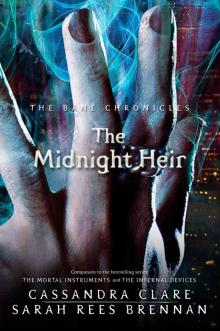 The Midnight Heir
The Midnight Heir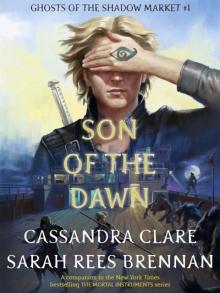 Son of the Dawn
Son of the Dawn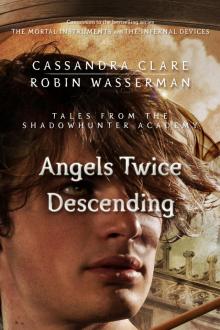 Angels Twice Descending
Angels Twice Descending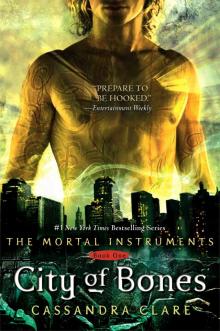 City of Bones
City of Bones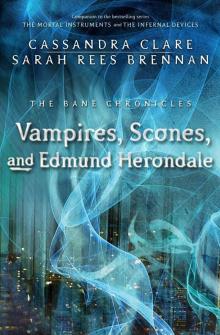 Vampires, Scones, and Edmund Herondale
Vampires, Scones, and Edmund Herondale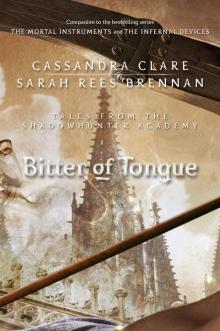 Bitter of Tongue
Bitter of Tongue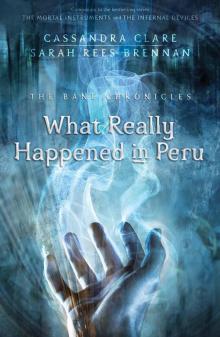 What Really Happened in Peru
What Really Happened in Peru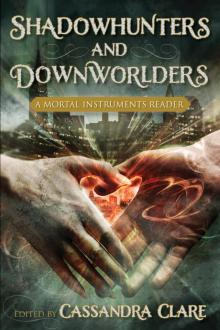 Shadowhunters and Downworlders
Shadowhunters and Downworlders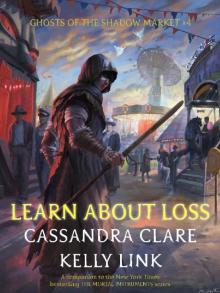 Learn About Loss
Learn About Loss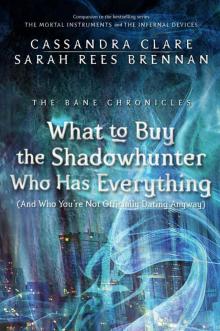 What to Buy the Shadowhunter Who Has Everything
What to Buy the Shadowhunter Who Has Everything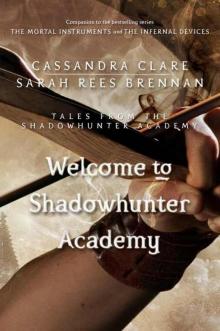 Welcome to Shadowhunter Academy
Welcome to Shadowhunter Academy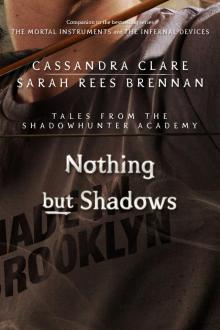 Nothing but Shadows
Nothing but Shadows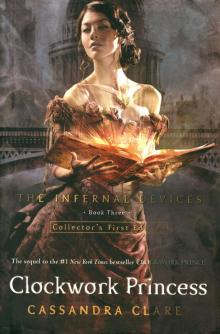 Clockwork Prince
Clockwork Prince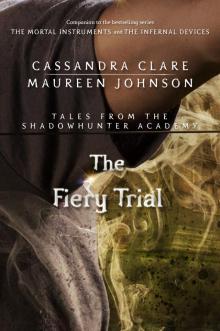 The Fiery Trial
The Fiery Trial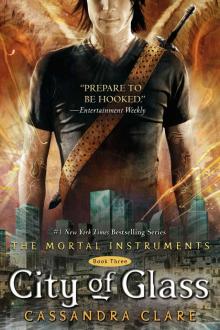 City of Glass
City of Glass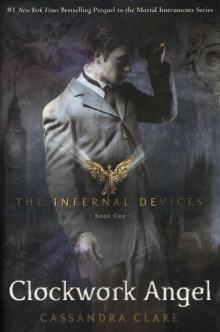 Clockwork Angel
Clockwork Angel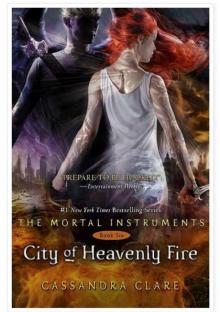 City of Heavenly Fire
City of Heavenly Fire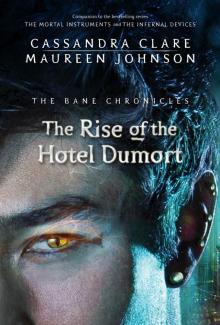 The Rise of the Hotel Dumort
The Rise of the Hotel Dumort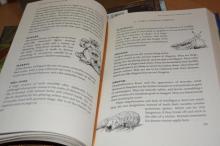 The Shadowhunters Codex
The Shadowhunters Codex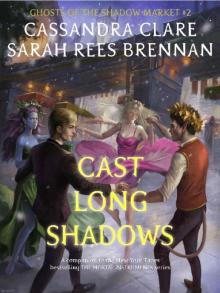 Cast Long Shadows
Cast Long Shadows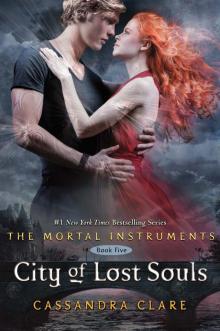 City of Lost Souls
City of Lost Souls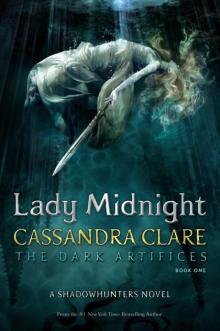 Lady Midnight
Lady Midnight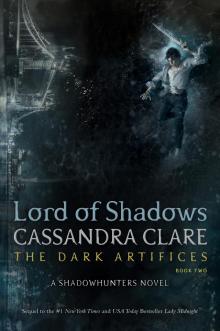 Lord of Shadows
Lord of Shadows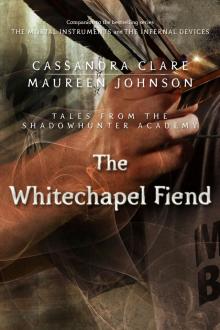 The Whitechapel Fiend
The Whitechapel Fiend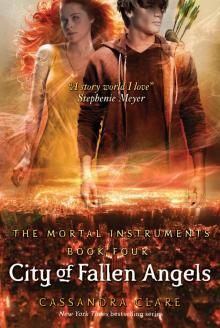 City of Fallen Angels
City of Fallen Angels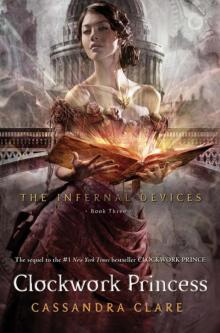 Clockwork Princess
Clockwork Princess Queen of Air and Darkness
Queen of Air and Darkness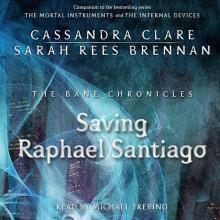 Saving Raphael Santiago
Saving Raphael Santiago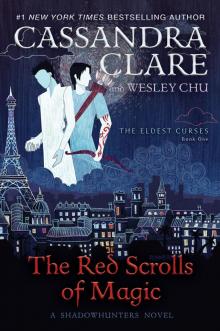 The Red Scrolls of Magic
The Red Scrolls of Magic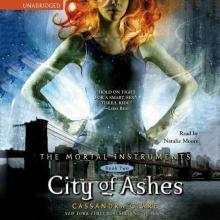 City of Ashes
City of Ashes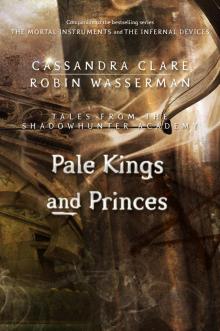 Pale Kings and Princes
Pale Kings and Princes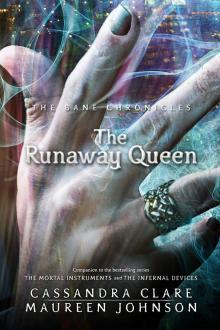 The Runaway Queen
The Runaway Queen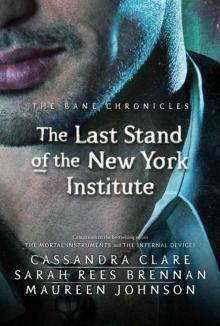 The Last Stand of the New York Institute
The Last Stand of the New York Institute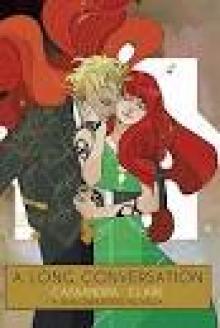 A Long Conversation (The Shadowhunter Chronicles)
A Long Conversation (The Shadowhunter Chronicles)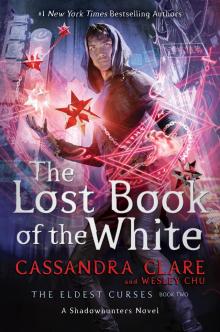 The Lost Book of the White
The Lost Book of the White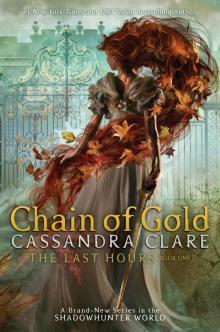 Chain of Gold
Chain of Gold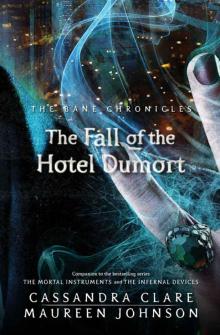 The Fall of the Hotel Dumort
The Fall of the Hotel Dumort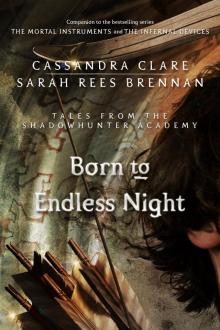 Born to Endless Night
Born to Endless Night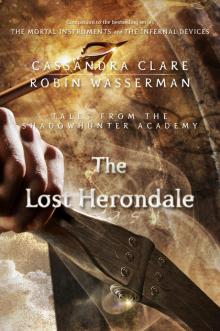 The Lost Herondale
The Lost Herondale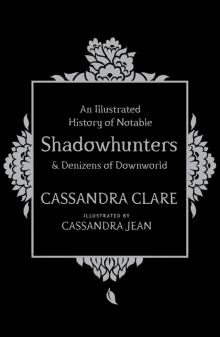 An Illustrated History of Notable Shadowhunters & Denizens of Downworld
An Illustrated History of Notable Shadowhunters & Denizens of Downworld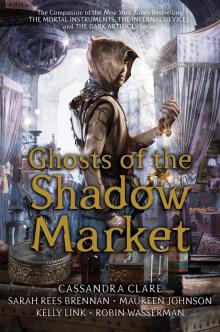 Ghosts of the Shadow Market
Ghosts of the Shadow Market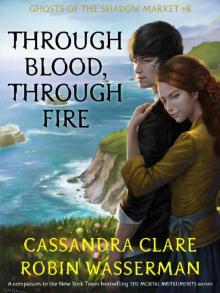 Through Blood, Through Fire
Through Blood, Through Fire Every Exquisite Thing
Every Exquisite Thing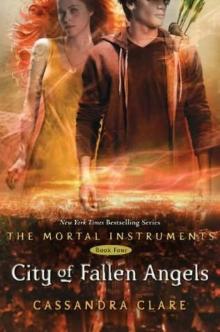 City of Fallen Angels mi-4
City of Fallen Angels mi-4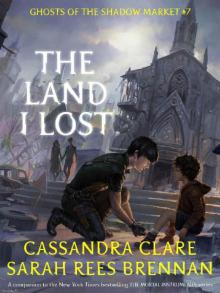 The Land I Lost (Ghosts of the Shadow Market Book 7)
The Land I Lost (Ghosts of the Shadow Market Book 7) Queen of Air and Darkness (The Dark Artifices #3)
Queen of Air and Darkness (The Dark Artifices #3)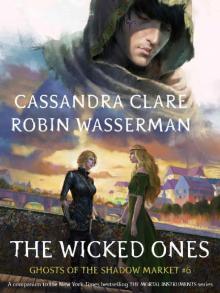 The Wicked Ones (Ghosts of the Shadow Market Book 6)
The Wicked Ones (Ghosts of the Shadow Market Book 6)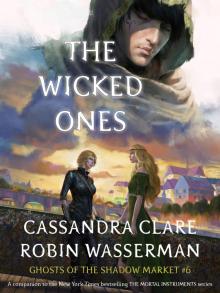 The Wicked Ones
The Wicked Ones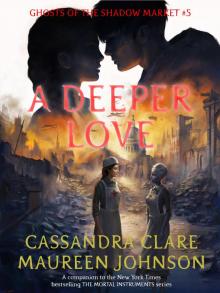 A Deeper Love
A Deeper Love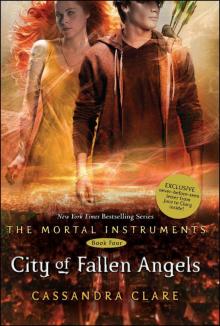 City of Fallen Angels (4)
City of Fallen Angels (4)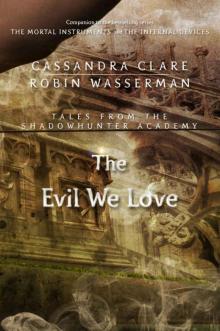 The Evil We Love (Tales from the Shadowhunter Academy Book 5)
The Evil We Love (Tales from the Shadowhunter Academy Book 5) Vampires, Scones, and Edmund Herondale tbc-3
Vampires, Scones, and Edmund Herondale tbc-3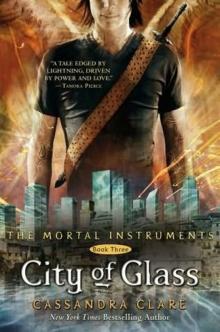 City of Glass mi-3
City of Glass mi-3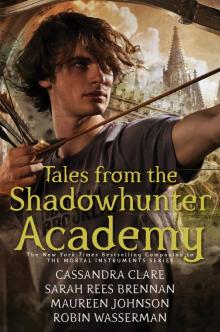 Tales from the Shadowhunter Academy
Tales from the Shadowhunter Academy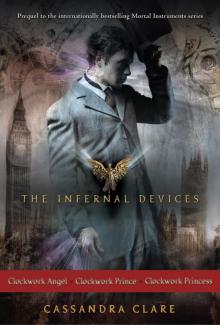 The Infernal Devices Series
The Infernal Devices Series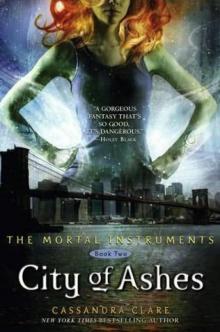 City of Ashes mi-2
City of Ashes mi-2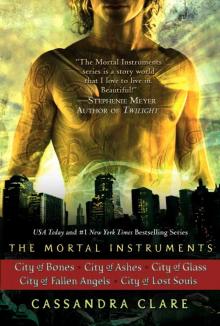 Cassandra Clare: The Mortal Instruments Series
Cassandra Clare: The Mortal Instruments Series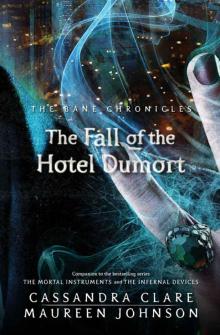 The Bane Chronicles 7: The Fall of the Hotel Dumort
The Bane Chronicles 7: The Fall of the Hotel Dumort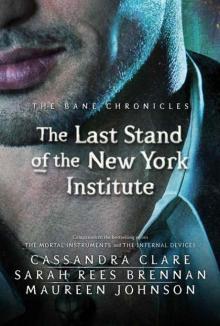 The Last Stand of the New York Institute (The Bane Chronicles)
The Last Stand of the New York Institute (The Bane Chronicles)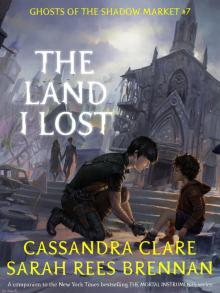 The Land I Lost
The Land I Lost![Saving Raphael Santiago - [Bane Chronicles 06] Read online](http://i1.bookreadfree.com/i1/04/03/saving_raphael_santiago_-_bane_chronicles_06_preview.jpg) Saving Raphael Santiago - [Bane Chronicles 06]
Saving Raphael Santiago - [Bane Chronicles 06]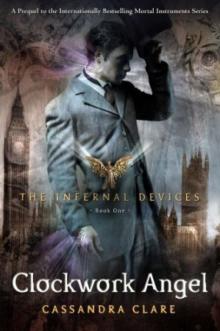 Clockwork Angel tid-1
Clockwork Angel tid-1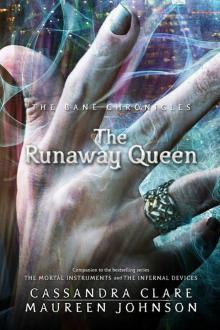 The Runaway Queen tbc-2
The Runaway Queen tbc-2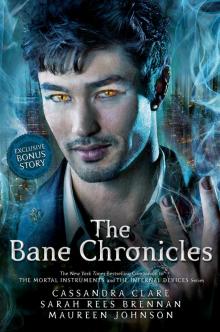 The Bane Chronicles
The Bane Chronicles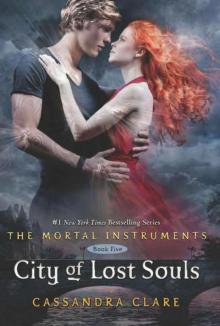 City of Lost Souls mi-5
City of Lost Souls mi-5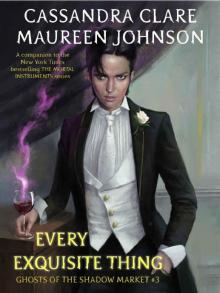 Every Exquisite Thing (Ghosts of the Shadow Market Book 3)
Every Exquisite Thing (Ghosts of the Shadow Market Book 3)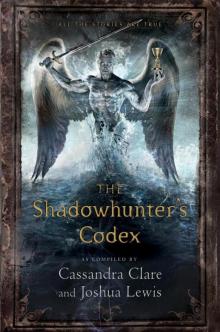 Shadowhunter’s Codex
Shadowhunter’s Codex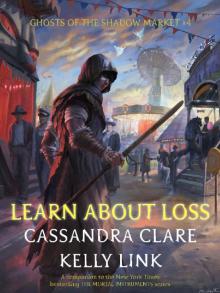 Learn About Loss (Ghosts of the Shadow Market Book 4)
Learn About Loss (Ghosts of the Shadow Market Book 4)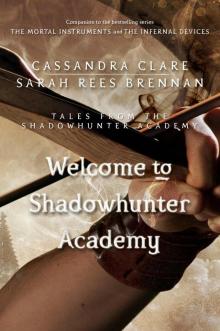 Welcome to Shadowhunter Academy (Tales from the Shadowhunter Academy Book 1)
Welcome to Shadowhunter Academy (Tales from the Shadowhunter Academy Book 1)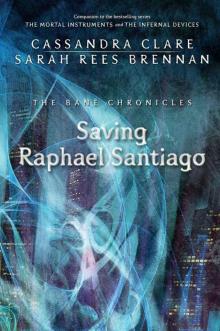 Saving Raphael Santiago tbc-6
Saving Raphael Santiago tbc-6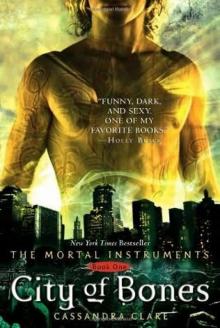 City of Bones mi-1
City of Bones mi-1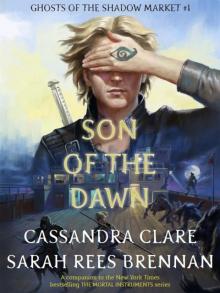 Ghosts of the Shadow Market Book 1_Son of the Dawn
Ghosts of the Shadow Market Book 1_Son of the Dawn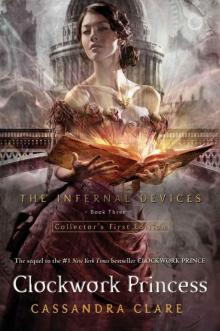 Clockwork Princess (Infernal Devices, The)
Clockwork Princess (Infernal Devices, The) Clockwork Prince tid-2
Clockwork Prince tid-2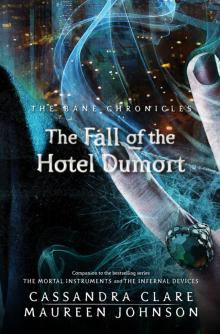 No Immortal Can Keep a Secret
No Immortal Can Keep a Secret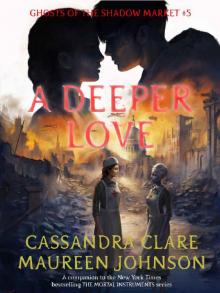 A Deeper Love (Ghosts of the Shadow Market Book 5)
A Deeper Love (Ghosts of the Shadow Market Book 5)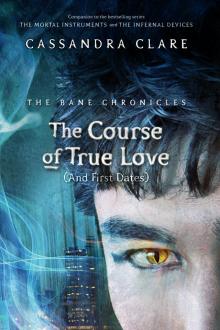 The Course of True Love (and First Dates)
The Course of True Love (and First Dates)